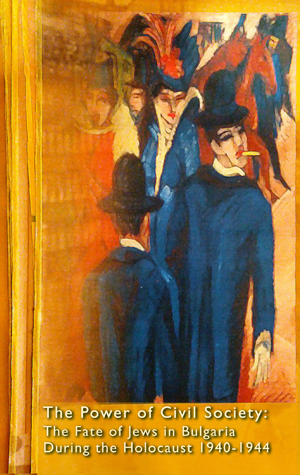How Bulgaria Saved Its Jews
Hillel exhibition reveals little-known piece of Holocaust history

While the Holocaust claimed the lives of six million Jews living across Europe, one country was able to shield nearly all of its Jewish citizens from deportation and death. That newly revealed godsend is the subject of a provocative exhibition at BU’s Florence and Chafetz Hillel House Rubin-Frankel Gallery.
The Power of Civil Society: The Fate of Jews in Bulgaria During the Holocaust, 1940–1944 chronicles the courageous refusal of that country’s citizenry to comply with government plans to surrender its Jews to Germany. In fact, individuals as well as some of Bulgaria’s most powerful institutions conspired to thwart the government’s efforts to deport the 50,000 Jews living inside its borders. First put together in 2008, the exhibition has never before been shown in the United States. A reception will be held at the gallery tomorrow, Thursday, September 27.
“I didn’t know this story at all,” says gallery director Holland Dieringer (CFA’05), noting that despite the heroic nature of the episode, the details remained hidden behind the Iron Curtain for decades.
Dieringer says it’s no coincidence that the exhibition coincides with the Jewish High Holy Days, a period of reflection and forgiveness. “During this sacred time, the exhibition not only inspires contemplation of the Holocaust and those millions of Jews who lost their lives,” she says, “it also stands as a bastion of hope, reminding us that even in the darkest of times, we are capable of making the right choices.”
The show emphasizes that this is not a story about good or bad nations, but “about the choices that each one of us makes…in any era…it’s about feeling sympathy for other people’s pain. It’s about solidarity.”
In a series of photographs and accompanying text, The Power of Civil Society traces efforts by Germany to force Bulgaria to surrender its Jews. By late 1940, the government had drafted and ratified anti-Semitic legislation, despite protests from citizens. Authorities began confiscating all radios and telephones owned by Jews, who were forced to pay a one-time tax of 20 percent of their net worth. Two years later, the government passed another discrimination law, giving the executive branch of the government authority to settle the “Jewish question” without having to seek parliamentary approval.

Despite the government’s acquiescence to the German demands, the people resisted. Some members of the Bulgarian Parliament spoke out in defense of the country’s Jews, and non-Jewish Bulgarian bankers secretly helped Jewish banks pay salaries to Jewish clerks who had been laid off. Perhaps most critically, the powerful Bulgarian Orthodox Church repeatedly denounced efforts to deport the country’s Jews, sheltering rabbis and even baptizing some Jews in an effort to spare their lives. The Holy Synod met with King Boris III and sent many letters of protest to the government, one of which ends with a line from the Gospel of Matthew: “The measure you give will be the measure you get.”
By 1944, it was clear to Germany that Bulgaria, which had joined the Axis powers in 1941, was an “unreliable ally” and by summer that year the country entered the war on the side of the Allies. Some 30,000 Bulgarian soldiers would die fighting the Germans.
The Power of Civil Society, says Dieringer, serves as a timely reminder “that you have a choice to either follow government dictums or defend what you believe is morally right.”
A reception for the exhibition The Power of Civil Society is being held tomorrow, Thursday, September 27, at the Florence and Chafetz Hillel House Rubin-Frankel Gallery, 213 Bay State Rd., from 7 to 9 p.m. The reception, free and open to the public, will feature a performance by the Bulgarian-Boston dance ensemble Ludo Mlado and refreshments will be served. The exhibition opened September 1 and runs through October 15. Gallery hours are Monday through Saturday, 9 a.m. to 9 p.m. and Sunday from 3 to 9 p.m.
Comments & Discussion
Boston University moderates comments to facilitate an informed, substantive, civil conversation. Abusive, profane, self-promotional, misleading, incoherent or off-topic comments will be rejected. Moderators are staffed during regular business hours (EST) and can only accept comments written in English. Statistics or facts must include a citation or a link to the citation.